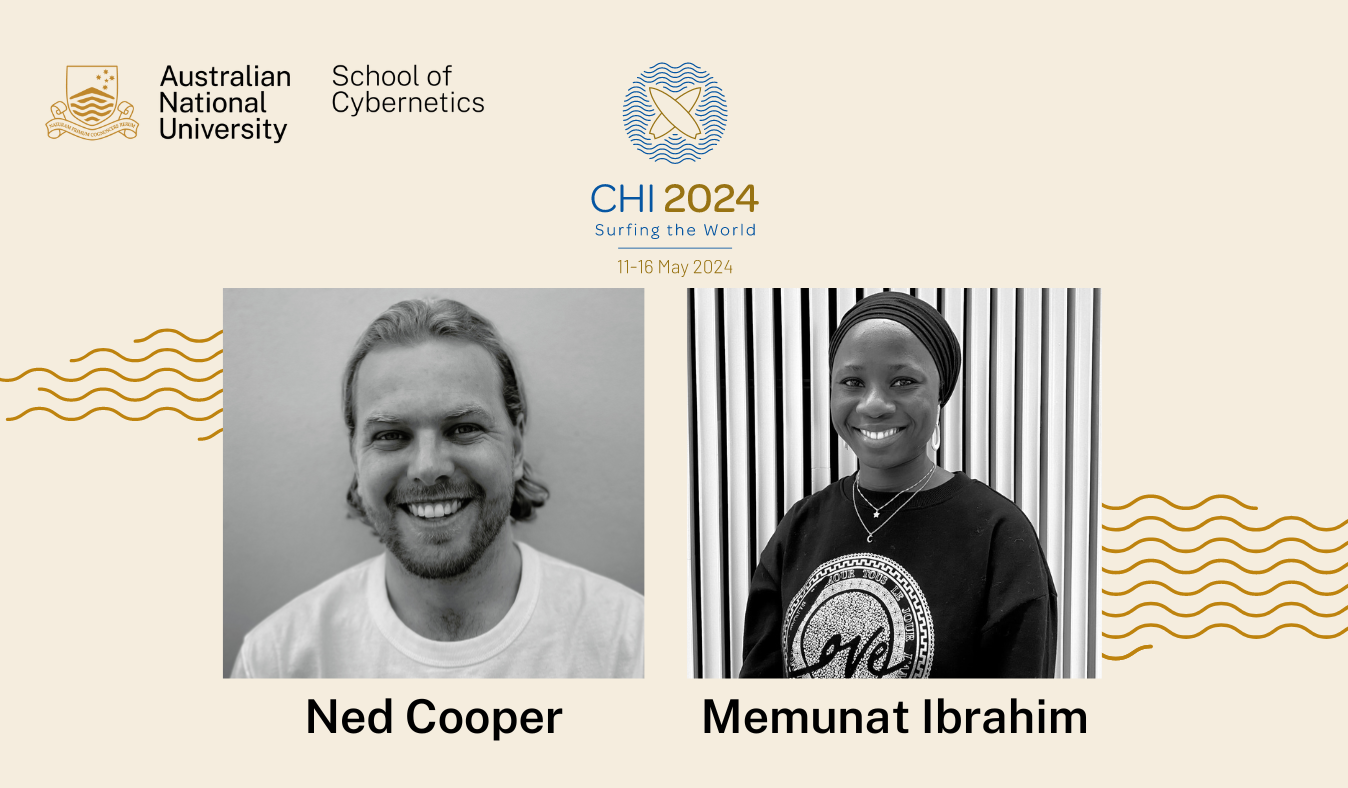ANU School of Cybernetics PhD students Memunat Ajoke Ibrahim and Ned Cooper will both be attending and presenting at the Association for Computing Machinery (ACM) CHI 2024 Conference on Human Factors in Computing Systems.
CHI 2024 is taking place May 11-16 in Hawai’i, with the central theme of Surfing the World. This theme embraces pushing forward the wave of cutting-edge technology and riding the tide of new developments in human-computer interaction.
“I’m looking forward to meeting and socialising with experts and colleagues from around the world, finding out what other work is happening in my field, and learning from them.” - Memunat Ajoke Ibrahim
The papers accepted by CHI highlight how our PhD students from the ANU School of Cybernetics are surfing the waves of cutting-edge technology to design better, safer, and more sustainable futures.
Memunat’s research sits at the intersection of society and inclusive technology design. Her PhD project looks at current Nigerian road users – their needs and values – in order to identify design factors for autonomous driving vehicles. The piece of this work Memunat is bringing to CHI 24 revolves around the experience of conducting research in Nigeria.
Ned’s research critically examines existing approaches to participatory machine learning and proposes new methodologies grounded in human-computer interaction (HCI) principles. The component of Ned’s work that he will present at CHI 24 explores the experiences of participation brokers in machine learning development projects through a series of interviews.
“I really enjoy attending HCI conferences because the topics are so diverse—it is a very broad research community! I am particularly looking forward to discussing links between HCI and policymaking at this year’s conference.” - Ned Cooper
Conferences are one of the best ways for academics to connect to the communities of work, practise, people, research, opportunities, and futures of their field(s).
This is especially true for the School of Cybernetics’ PhD students, such as Memunat and Ned, as they are establishing themselves in their fields, in academia, and transitioning into the roles of early career researchers.
Research Paper Abstracts & CHI 2024 Session Times:#
Expectations Vs Reality of Conducting Ethnographic Research in Nigeria to Inform Autonomous Ground Vehicles Design
Memunat Ajoke Ibrahim, Elizabeth Williams and Susan Hansen.
Abstract: We present a comparative reflection of our experiences designing and conducting ethnographic user research in understudied real-world contexts – Nigerian road traffic. We present our experiences planning and doing fieldwork to investigate and map Nigerian road users’ on-road experiences and perspectives on trust and safety in real-world traffic, towards identifying design factors to inform trustworthy autonomous ground vehicle design. We compare our expectations and plans for the fieldwork to the reality of conducting the research in a multicultural country like Nigeria. We describe how some contextual research factors – including geopolitical, institutional, cultural, infrastructural, safety, and trust factors – affected the fieldwork, and how we addressed them by adapting the methodology to be suitable for the research contexts, populations, and societies. Our insights may be useful for researchers designing or conducting ethnographic research in multicultural communities to capture understudied perspectives to inform technology design practices in a culturally sensitive manner.
Memunat will present on this paper at CHI 2024 as part of Case Studies: Automation session on Thursday the 16th of May at 11:15am.
You can read Memunat’s paper here.
From Fitting Participation to Forging Relationships: The Art of Participatory ML
[Ned Cooper] and Alex Zafiroglu
Abstract: Participatory machine learning (ML) encourages the inclusion of end users and people affected by ML systems in design and development processes. We interviewed 18 participation brokers—individuals who facilitate such inclusion and transform the products of participants’ labour into inputs for an ML artefact or system—across a range of organisational settings and project locations. Our findings demonstrate the inherent challenges of integrating messy contextual information generated through participation with the structured data formats required by ML workflows and the uneven power dynamics in project contexts. We advocate for evolution in the role of brokers to more equitably balance value generated in Participatory ML projects for design and development teams with value created for participants. To move beyond ‘fitting’ participation to existing processes and empower participants to envision alternative futures through ML, brokers must become educators and advocates for end users, while attending to frustration and dissent from indirect stakeholders.
Ned will present this paper at CHI 2024 as part of Participatory AI session on Wednesday the 15th of May at 11:15am.
You can read Ned’s paper here.

